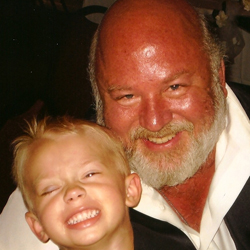We asked sources in our Public Insight Network to tell us what it's like living with diabetes -- both type 1 and type 2. We asked them to share what they've learned living with this disease and the misconceptions they deal with. Click on the photos below to read their stories.


Sloane Wesloh, Stillwater, age 15
Living with type 1 diabetes for three years
I was diagnosed with type 1 diabetes when I was 12. I lost many pounds, I was drinking over 300 oz. of water every day, I was heading to the bathroom literally every few minutes and I felt horrible. By the time I was diagnosed, my blood sugar was well over 600 mg/dl (the highest blood sugar that a blood sugar meter can register) and I was skin and bones. I spent three days in Children's Hospital, surrounded by people who knew exactly what I was going through and way more stuffed animals than anyone would ever need. At the age of 12, the islet cell function in my pancreas had shut down for an unknown reason and I was now in charge of balancing my blood sugar and injecting insulin through the use of syringes several times a day. I went back to 7th grade with a backpack that held the typical textbooks and pencils, with the new addition of syringes and vials of insulin. Once I knew the basics on how to manage this disease and my parents knew that I was okay on my own, I would sit outside my locker before lunch with my lunchbox and slowly count the carbs of everything I was going to eat and then use a calculator to determine the amount of insulin I should inject. Would I go low? Would I go high? Would I faint? The possibilities seemed endless. I was the only diabetic at my small charter school. The school nurse spent most of her day at the other building that made up my school and the receptionist had a fear of blood and needles. I was on my own at school.
At the time of my diagnosis, I had played classical violin and viola for seven years. I loved playing viola. When I was diagnosed, my new goal in life was to achieve normal blood sugars. I quit viola. My fingers wouldn't move, I would tear up when I went to practice etudes, two hours of orchestra left me totally and completely exhausted. I was done.
For months there was nothing I liked doing because to me, I had to keep my diabetes under control and I had to figure this whole disease thing out before I could do anything else. I ignored my music, I quit Minnesota Youth Symphonies, I stopped going to my lessons. When you spend seven years immersed in music, a few months without it is like living in a world without sound.
I slowly gained back some weight and became more comfortable with the injections, blood sugar testing and eating routine. It was springtime, for Minnesota and for me. I dug out my viola.
Today, you can find me at orchestra on most Saturday mornings, with my bright yellow viola case covered in bumper stickers. My favorite one says, "Don't Underestimate the Power of Diabetics." It's true. I live with this disease that has the power to rule me, but like many diabetics I have chosen to rule my disease. When I play viola, it is the only time that I don't feel the scars, the needles, high or low blood sugars. It's in playing viola that I realize that I CAN control my diabetes, it doesn't control me.
Living with type 1 diabetes is a constant fight, with the knowledge that I will never win. I am grateful every day for the advancements that have been made and are being made in diabetes treatments, cures and technology. Type 1 diabetics are able to have long and healthy lives thanks to these advancements. Not only are blood sugar meters safer and insulin pumps more reliable, but they are starting to fit into my lifestyle. At age 15, I go to parties, I wear dresses, I am without my parents for most of the day a lot of the time and I absolutely do not want to wear a fanny pack. The fact that I can have one of the most reliable blood sugar meters in the color bright purple is fantastic. I AM more than a diabetic after all!


Kristen Wesloh, Stillwater
Mother of Sloane Wesloh, who's had type 1 diabetes for three years
Diabetes is an expensive disease that requires 24/7 management. Even with a good health insurance plan, our out-of-pocket medical expenses last year totaled more than $19,000.I am so thankful for the changes President Obama has made to our healthcare system, because I no longer have to worry about our daughter having health insurance during her young adult years, being refused coverage because of her disease, or reaching a lifetime coverage cap.
I do, however, continue to worry about how we're going to pay for college for her and her brother, and the fact that we may be supporting her (physically and financially) well into her adulthood.
Because type 2 diabetes is so prevalent, people don't understand that type 1 diabetes is a very different disease. People with type 1 may eat whatever foods they want, as long as they give themselves insulin to offset the carbohydrates in their food (this is what the body does naturally when it has a working pancreas). Media stories about people "curing" diabetes via strict eating plans do NOT apply to people with type 1 diabetes.
While we appreciate people asking if it's "ok" for my daughter to eat something, we'd prefer to be treated normally with the understanding that, if there's something being served that she doesn't want to eat, she'll politely say no thank you. (And most of the time, it's because she's a picky eater, not because of her diabetes!)


David Cargo, St. Paul
Diagnosed with type 2 diabetes in 1998
When I first found out I had diabetes, I was somewhat in shock, since I didn't really know what the full implications were. It took a few weeks to get a glucometer and learn how to use it, and to get into a diabetes education class. In my case, once I lost weight (about 40 lbs. over eight months), I stopped needing diabetes medication. I don't generally have to worry about hyperglycemia, but I do have to be careful of hypoglycemia.Diabetes has put some limits on my activities. I have to be more careful about what I eat and when. Several lifestyle changes were required. I need more frequent checkups than I did before. I need to monitor my blood sugar before vigorous physical activity. I live with a certain level of frustration because I can't be as spontaneous as I would like to be.


Constance Schey, Minneapolis
Living with type 1 diabetes since 1982
When I was diagnosed, I was fresh out of college, learning to live on my own, and had too much misguided pride to take a step back and go back to live with my parents in Chicago while I got used to the idea. I had no idea of the effect that high or low blood sugar would have on my psychological well-being, and I was so angry to be saddled with diabetes that I railed against it for years.The information I got initially from doctors and from education gave me nothing but "things to be afraid of": future blindness, better not have children (they might have diabetes because I do), future heart problems, amputation of my feet. I refused to deal because nothing was positive and all anyone did was scold me for not being responsible. Fifteen years later I attended a course at Mayo Clinic that finally addressed my rage and answered my questions without making me feel like a misbehaving child, and I've been able to handle my condition much better ever since.
It's important for non-diabetics to understand that a lot of things they take for granted are not so automatic for diabetics. If I want to ride my bicycle to work in the morning, and my blood sugar level is too low or too high, I can't do that. If I'm at your house for dinner, and you said dinner would be at 8pm, I will plan to eat at that hour, and we need to eat at 8pm. At the same time, I am just like any other handicapped individual -- I don't want to be the center of attention or given special treatment. It's a thin line.


Joe Larsen, Minneapolis
Living with type 1 diabetes for 13 years
I feel that I have the capability to do most things that anyone without diabetes can do, but diabetes is the proverbial monkey, always affecting dietary and exercise activities.
Though I don't live with complications right now, I am always concerned about how loved ones and future children may be effected. I fully expect that diabetes will present limitations as I age, and I am afraid that my capacity to provide and parent will be affected.
In some ways, diabetes has inspired me to live a life with a balanced diet and exercise regimen. Literally and metaphorically, diabetes forces us to live in balance.


Amy Felegy, Mounds View, age 13
Living with type 1 diabetes for 11 years
Diabetes has always been a way of life for me. I don't remember the days where I didn't go to doctor's visits every month, constantly looking at the nutrition label or pricking my finger 10 times a day.
I honestly do not think that my life would be much different without diabetes. I go to sleepovers and talk about boys, attend camp, school, and the shopping mall just as any other 13-year-old girl does! I love sports (my favorites are dance and soccer). I don't look any different than if I was "normal." I'm a happy, bubbly, outgoing, silly, girl -- even if you take my diabetes away!
One thing that I need to clarify is that I am NOT lucky to eat/drink in class to treat my low blood sugars. Kids say,"I'm so hungry right now. You're so lucky that you can eat whenever because you have an excuse." I HAVE to eat, even when I'm not hungry. I HAVE to eat, even when I'm ill and don't feel like eating. Also, there are times when I can't eat food when my blood sugars are high. I can't eat then, even if I really am hungry.
Until people get to know me, all I hear are questions. They assume that I can't eat sugar or they think that I'm contagious (Ha!). They don't understand what that "thing" is on my belt (insulin pump) or why I always leave class (to test my blood sugars). And that's OK! Everyone has the right to know. Even my best friends still have questions. Even my parents still have questions. And don't get me wrong -- I still have questions!
My classmates feel bad for me because of my condition, but all I really want is to be a normal kid and to fit in like everyone else. Most people take that for granted. I have dreams like everyone else. Just because I have diabetes, it doesn't mean that I can't live 100 more years!


Jeffrey Cloninger, Minneapolis
living with Type 1 diabetes for 20 years, diagnosed at age 15
Simply put: it's a serious disease, especially left untreated. I've tried to make the most of it; it's forced me to take an active role in my own health. In many ways, it's enlightened the decisions I make on a daily basis, for the better. I eat more healthy because of the disease. I think about what goes in my body. It's made me much more aware of my own self.
People fail to realize the emotional ramifications of living with diabetes. So much of the focus is on how the disease affects the body's systems and organs, ignoring the very real day-to-day burdens that those living with diabetes -- and friends and family who support us -- face. Mood swings can be common. Judgment, shame and depression about blood sugar levels, A1c (average glucose control) numbers, and the gravity of knowing this body will never work "quite right" go hand-in-hand with diagnosis and ongoing treatment. We need to create a greater awareness of this emotional component and provide a more holistic approach to treatment.
As a Type 1, no matter how healthy I am, this isn't going away. Not until a cure is found. We are close, but for now, my insulin pump is my best friend...and a true life saver.


Cassie Burt, Minneapolis
Living with type 1 diabetes for 12 years, diagnosed at age 15
Too much stress leads to poor blood glucose control, so job and lifestyle choices are always impacted by living with diabetes. One of the most challenging aspects of living with this condition is the need to have not just health insurance, but good health insurance. This means we are limited in the career/job choices we make, and in a bad economy that is a major concern. I would love to work more independently but the lack of financial security in trying to start a small business could easily lead to lacking diabetes management, causing complications and possibly hospitalization.
The best doctor I have had also has type 1 diabetes. She knew the real challenge was having the discipline to do self injections and blood tests many times a day and stay positive through it all.
I have the privilege to work at the International Diabetes Center in Diabetes Research, and even being surrounded by the best minds in the field I can still see how complex the condition is for patients and providers. Those not living with the condition need to be sensitive to the ups and downs (literally) we face throughout every day and night. Burnout is real.


Laure Campbell, Falcon Heights
Living with type 1 Diabetes for 36 years
Living with diabetes has affected me in many ways. I changed from clinical nursing positions to positions that did not require overtime or shift rotations. I am more health conscious than I would have been otherwise. I started dealing with issues of mortality earlier than others.
People have many misconceptions, but the misconception that strikes me most often is that living with diabetes is a terrible burden. It is a challenge, but no more so than parenthood, aging parents, any illness, job loss, etc. One accommodates to it.
I have an analogy I use. If you had never cared for your teeth, and saw a dentist for the first time, he or she would tell you that for the rest of your life, you have to use a special brush to scrub every tooth twice every day. And when you are done, you have to use special thread to floss between every tooth. Every tooth. Every day. On top of that, you have to see a dentist twice a year for a professional exam and cleaning of your teeth. There are people who would be utterly overwhelmed by this; who would throw up their hands and say, "I can't live like this!"
In time, checking blood glucose levels, taking insulin, and managing diabetes is as much a part of every day as dental hygiene. There are crises and unexpected problems, but it becomes surprisingly mundane.


Elizabeth Turner, Minneapolis
Living with type 1 diabetes for 20 years, diagnosed at age 7
Diabetes makes everyday tasks just a little more time consuming and difficult. Each meal or snack requires a blood test and insulin to account for the amount of food consumed; exercise has to be planned and accounted for; and traveling requires forethought. I have to make sure I have all my supplies with me: test strips, insulin, infusion sets and cartridges for my insulin pump, batteries, and emergency supplies like syringes in case anything breaks. It's impossible to be carefree and take off without pre-planning how long I'll be gone and what supplies I'll need.
I've done my best not to let diabetes affect my life, but sometimes this is to the detriment of my health. I don't want people to know that I have the disease because I don't want to be treated differently. I don't want my constant blood sugar checking and carbohydrate counting to get in the way of social or work relationships. This leads to not giving insulin until after a meal, making my blood sugar rise unnecessarily. But after a childhood of being treated differently, it's difficult to willingly put myself in the same situation again. People may say they understand and it's no big deal, but I can't help but feel they see me as weak and view me with a patronizing eye. I'd rather they not know, which leads to less than optimal care for my diabetes. It's a no-win situation.
When people talk about the "rise of diabetes," they're really talking about the rise of type 2 diabetes. There is no prevention for type 1, and no cure. It's a daily struggle with no end in sight. Someone with type 1 told me that even if we do everything perfectly, we're only approaching normality, not super health. The pancreas is an amazing organ, and when one of its functions is gone (producing insulin), it's incredible to realize how much work that takes to approximate. It gives me greater appreciation for the complexity of the human body and all the functions it performs without my involvement.


David Johnson, Stillwater
Diagnosed with type 2 diabetes two years ago, likely living with it for five
Like many men I only go to the doctor when something is broken. Three years ago I knew something was wrong when I found myself sitting, unable to get up, as if my mind and body were separate. I was simply tired beyond belief. Went to the doctor, and after some talk I was told it was probably Seasonal Affective Disorder, (it was winter after all.)
The condition never went away. The following winter I went back in and the doctor took some blood tests, and I would be informed if they found anything. A few days later there was a message on my machine telling me I was type 2 diabetic and to contact the nurse to arrange for classes and medication.
There was a sense of relief. To finally be able to label what I was feeling, to have tools to manage what I was experiencing was exciting. The downside was the word "chronic." I wasn't going to be able to fix this; this was now my life. The classes were wonderfully blunt; this was going to get worse but for now let's deal with what we have in front of us. By being honest they allowed me to plan for the diminishment to come while still enjoying today.


Frank Elliott, Richfield
Living with type 2 diabetes for seven years
Diabetes has had a devastating impact on every part of my life. It and its medical impacts on my lungs, my muscles, my coordination, and my stamina led to me becoming progressively more ill and then disabled. I now have to take more than 20 prescription medications. Fortunately, my wife and I had long careers and planned well with our insurance programs. My wife constantly worries about me and it's a huge stress on her, although I am a very outgoing person. My agonizing pain, the way I collapse in pain and fatigue and my severe fatigue and lack of stamina make her wonder if I will make it.
As I've gradually become very ill and then disabled, I have found a tremendous well of encouragement, joy, and sharing of experiences with online friends from all around the United States and the world. Many of us who stay positive and resilient write back and forth and share our many stories and encourage each other. The main thing is to find and stay with a problem-solving orientation where we never give up. It will be a better year because I've made a promise to myself. My attitude of fully embracing now and striving will improve. That much has become clearer and clearer to me over the last seven years.
If I can keep my mind active and immerse myself in the love of learning, then I can be the best disabled Frank that is possible. Sure I have many limits, have many illnesses, have very poor stamina, but I think about the infinite variety of subjects, projects, people, networks of friends that there are out there. What is one-fifth of infinity? It is still infinity. There is so much to learn about. Despite being in pain, falling down often, having terrible cramping, and not being able to breathe, I can be OK in my online world. I try not to feel sorry for myself or be incredibly mad. There is a very wide electronic world where I can be very creative and be involved with many other creative people and those needing help like I do.
Are you living with diabetes? Share your experiences and insights here.
Sponsors
In The Spotlight
-
The Current Music Blog
Your daily note for good music, news and pop culture. With attempted jokes.
Sponsor
Become a sponsor

- Member Resources
- Become a Member
- Member Connect Accounts
- Leadership Circle
- Sustaining Members
- Member Discounts
- Become a Sponsor
- Tax Information
- Planned Giving
- Vehicle Donation
- Donate Stock
- Site Services
- Mobile
- Newsletter
- RSS Feeds
- Podcasts
- Blogs
- Videos
- HD Radio
- Find Programs
Minnesota Public Radio ©2023 All rights reserved

